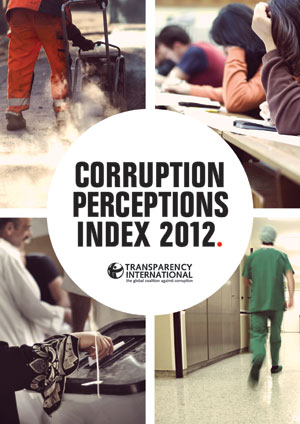Corruption Perceptions Index 2012: What is public sector corruption?
December 5th, 2012
December 5th, 2012
Cross-posted from Transparency International’s Space for Transparency blog. This post is an updated version of a similar Transparency International blog post from one year ago.
 The Corruption Perceptions Index highlights corruption in the public sector. But what exactly does this mean?
The Corruption Perceptions Index highlights corruption in the public sector. But what exactly does this mean?
Drawing on Transparency International’s Plain Language Guide, this post defines and de-mystifies some of the words and phrases most often associated with this kind of corruption. So if you’re confused by anything that you’ve seen on our website or in our faqs, read on.
First of all, let’s look at corruption itself. We use this word all the time, but what do we actually mean by it? Transparency International defines corruption broadly as the abuse of entrusted power for private gain. This can happen anywhere, and can be classified as grand or petty, depending on the amounts of money lost and the sector where it occurs.
Grand corruption
Definition: acts committed at a high level of government that distort policies or the central functioning of the state, enabling leaders to benefit at the expense of the public good.
Example: In 1996, two former South Korean presidents, Roh Tae-woo and Chun Doo-hwan, were found guilty in a corruption case linking them to the chaebols (large family-owned businesses with strong political ties), which had paid off top political leaders in exchange for unfair business advantages.
Petty corruption
Definition: everyday abuse of entrusted power by low- and mid-level public officials in their interactions with ordinary citizens.
Example: In Bangladesh, a study revealed that 44 percent of those surveyed reported being a victim of petty corruption in public health centres, while 39 percent had reportedly suffered similar problems in dealing with the public education system.
That covers different types of corruption. Next up, what exactly is the public sector? Here’s an explanation.
Public sector
Definition: The government and its decentralised units – including the police, military, public roads and transit authorities, primary schools and healthcare system – that use public funds and provide services based on the motivation to improve citizens’ lives rather than to make a profit.
From these definitions, a picture of corruption in the public sector begins to emerge – any kind of abuse of entrusted power for private gain that takes place within the government or government bodies counts.
Those who have been entrusted with power – public officials, for example – can benefit privately in several ways. Some of these are:
Bribery
Definition: the offering, promising, giving, accepting or soliciting of an advantage as an inducementfor an action which is illegal, unethical or a breach of trust. Inducements can take the form of gifts, loans, fees, rewards or other advantages.
Example: more than 15 percent of respondents to a national household survey in Guatemalareported that they paid a bribe when trying to (re)connect to the public water system.
Embezzlement
Definition: when a person holding office in an institution, organisation or company dishonestly and illegally appropriates, uses or traffics the funds and goods they have been entrusted with for personal enrichment or other activities
Example: Chung Mong Koo, former chairman of Hyundai Motors Co., was convicted in 2007 of embezzling US$ 110 million from company funds, a portion of which was allegedly used to pay off politicians and government officials.
Patronage
Definition: form of favouritism in which a person is selected, regardless of qualifications or entitlement, for a job or government benefit because of political affiliations or connections.
Example: In Kenya, harambee – voluntary contributions to community development projects – has reportedly become a tool for patronage used by politicians to garner votes, maintain the loyalty of their electorate, and solidify and shape political leadership at the local level.
Nepotism
Definition: form of favouritism based on acquaintances and familiar relationships whereby someone in an official position exploits his or her power and authority to provide a job or favour to a family member or friend, even though he or she may not be qualified or deserving.
Example: In the European Commission, one of the most sensational cases of corruption involved allegations that the Commissioner of Research and Education from 1995-1999, Edith Cresson, a former French prime minister, used nepotism in hiring her dentist to produce reports on AIDS research, although he lacked any background or qualifications for the position.
Conflict of interest
Definition: situation where an individual or the entity for which they work, whether a government,business, media outlet or civil society organisation, is confronted with choosing between the duties and demands of their position and their own private interests.
Example: the Law on Conflict of Interest in Bosnia-Herzegovina restricts elected officials, executives and advisors in government institutions from certain activities if they result in private or material gain. These include acts related to the promising of employment, granting of privileges based on party affiliation, giving of gifts, and provision of privileged information on state activities.
All sorts of processes in the public sector are vulnerable to these kinds of corruption. One of these processes is:
Procurement
Definition: a multi-step process of established procedures to acquire goods and services by any individual, company or organisation – from the initial needs assessment to the contract’s award and service delivery.
Example: The city of Buenos Aires found a very wide dispersion in the prices paid for basic, identical products to supply its hospital network, such as needles, syringes, intravenous solutions, x ray film and sanitary materials, raising suspicion that corruption had tainted the procurement process.
If you’re keen for more explanations of commonly used anti-corruption terms, you can read the rest of the plain language guide here.